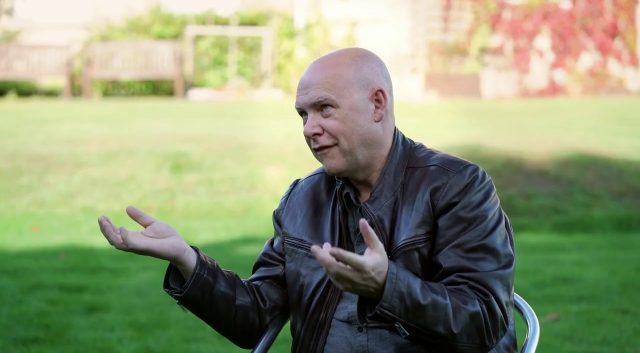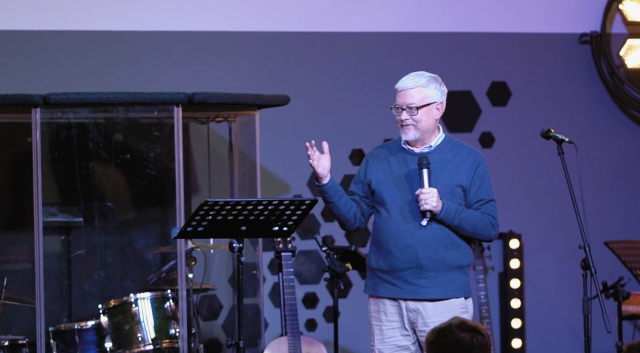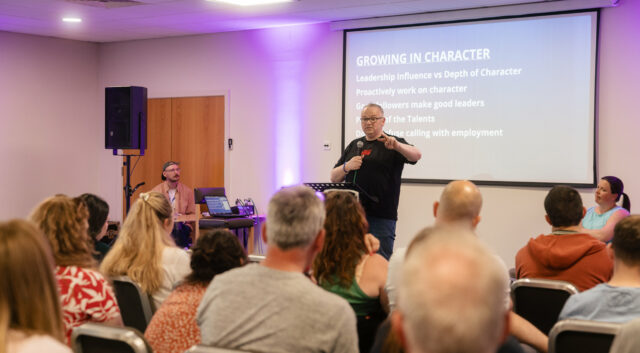Rich Nathan is the senior pastor of vineyard columbus, a respected statesman of the vineyard, a passionate evangelist, and a clear-thinking Bible scholar. He has written several books. most relevant to this interview is ‘Who is my enemy?’, published in 2002. Here he is interviewed by Cutting Edge Magazine.
Jeff Heidkamp: What are definitions of “Biblical faithfulness,” in your words?
Rich Nathan: I quote Joshua 1:8: “Do not let this book of the law depart from your mouth. Meditate on it day and night so that you may be careful to do everything written in it; then you’ll be prosperous and successful.” Breaking that into three parts, I need to speak God’s word, I need to study God’s word, and I need to do God’s word.
In Charles Spurgeon’s book on preaching, he said that he wanted to produce preachers that, when we cut them, their blood runs the gospel’s storyline. You have the basic story of Scripture in your core, the story of the creation and fall and God’s plan to bring a blessing through Abraham and the anticipation of Messiah. And on top of that is speaking, studying, doing.
For 20 years I’ve been operating with a perspective that people do not do what the pastor says – they do what the pastor does.
People internally ask, “Do you satisfy your thirst with the water that you’re recommending to everyone else? Do you live in the house that you’re constructing? If you want an evangelistic church, do you privately share your faith? Do you look for opportunities? If you want to pray in church, do you pray? If you want to give in church, are you sacrificial? Do you give more than a tithe?”
JH: Your approach to the Bible is bigger than proof-texting; you seem to take a broad, overarching view of the Bible as the framework for viewing all of life. What kind of practices help us do that?
RN: Something I do is to try to read through the Bible once a year, and I lead people who read the Bible that way as well. The folks I’m most drawn to are evangelicals of the UK variety, particularly people like Chris Wright. His book The Mission of God is so compelling to me; it shows the big things of the Bible. And so that helps me to think about everything. When I think about creation, fall and redemption and history and then new creation, I have a framework. When I teach on work, that’s the frame. When I teach on sex, that’s the frame.
JH: When we work hard at studying the Bible, and we find there are things that we don’t understand or questions that we don’t quite have answered, what does it mean to live under the authority of the Bible when we’re also living in the tension of what we don’t yet fully grasp?
RN: For years, I have taken the attitude that I don’t teach on what I don’t understand. So for years I didn’t teach the book of Revelation. I try to stay with things that I have clarity about and not just speculate or be an echo of somebody else’s views. To some degree, I want the word to be near to me before I deliver it to someone else.
This week I’m starting the book of Judges. You immediately run into the issue of genocide in the Old Testament. And how do we make moral sense of a God who authorizes, commands the extermination of a group of people? What does that mean for a 21st-century person? Beyond that, what does it mean for Christians, some of whom adopt that kind of language in contemporary culture and are at war with culture? This model raises all kinds of questions. But if you translate your thoughts, people can follow it, and it makes for really interesting preaching.
JH: What does it mean to have culturally relevant ministry?
RN: Well we’re not Gnostics, so we believe the Word became flesh. Certainly good preachers not only understand the world of the Bible, but they understand the world of today. Part of that is, how do I meaningfully communicate the ethics of Scripture, especially around flash points in the culture – like sexuality? How do you do that to not only just announce but have it be owned and really build a bridge
to your listener for whom Biblical sexual ethics is entirely foreign? So I think about that, and I use a number of different models for communication that seem to work – at least here in Columbus, Ohio.
JH: When we feel the tension, the cultural dissonance with Biblical faithfulness, there are two internal responses. One is the need to be the prophetic voice to speak against what’s in culture, and there are other times to reread the Bible in the light of our own culture. What’s some wisdom for navigating that?
RN: Part of the reason I love Scripture is because we do hear another voice, which is not just an echo of our own culture. It does plunge off into a mental world that’s very different than the mental world of the 21st century. That’s incredibly helpful, because we have no other way to get outside of ourselves. So it’s great that we’re constantly forced to deal with categories and approaches to life that are just so variant from the assumptions of today. Every week there are opportunities to bridge that.
Good preachers not only understand the world of the Bible, but they understand the world of today.
And I believe great preaching ought to be comprehensive, touching all of life and not just narrow selections. So I do talk a lot about politics, but I hope I don’t do it in a partisan way. And I do talk about economics, war and peace, health care, immigration. What is the heart of God? We can have a debate about moving from principle to program. So I stay away from programmic answers, but I do want people to have a Biblical worldview. At the end of the day, I want people to have the inclinations of their hearts shaped so that their knee-jerk reactions is the knee-jerk of Jesus.
JH: Could we talk about immigration as a case study? There is probably a massive political divide about this in anyone’s church, and yet you probably find a fairly unified pro-immigrant message in Scripture. What tensions move through your head as you talk about that?
RN: It’s important to for pastors to ask themselves a couple of questions before they get up and talk about issues like immigration or things that they know will have a push-back. First, “How long have I been pastor of this church and how much equity do I have?” If you’re the founding pastor, you probably have a lot more equity. If you’re a new pastor finding your feet, I probably wouldn’t recommend that you preach on immigration your first weekend.
On the other hand, we also need to think about pastoral courage. We shouldn’t avoid subjects just because we know that there might be opposition.
Third, how do we introduce new subjects? If the church has been conservative about women in leadership, or you know that there’s strong political anti-immigrant sentiment, you might decide that your first step is not to start by preaching on the subject on a Sunday morning, but rather to be a wise leader and change agent.
With many of the really controversial subjects, I started by having conversations with our staff and doing staff teaching on the subject of immigration, on race, on feminine leadership in church plants. Then I moved to our small group leaders and widened the circle. After that, I wrote congregational letters and articles and posted those online, and then I preached on it.
We shouldn’t avoid subjects just because we know that there might be opposition.
Sometimes, when we’re moving the church to real change, it should be against the backdrop of a long process of leadership. I wouldn’t start with major policy shifts through a Sunday morning message.
JH: To me, immigration represents an issue that could be divisive within a congregation. But sexuality is a topic where we’re light-years from culture, almost speaking Greek to others. We’re trying to speak truth lovingly. I don’t want to say you don’t want to offend them, but you don’t want to alienate them, so how do you talk about that ethic?
RN: There are a few frames that I use for talking about sexuality. I like the frame of “economic exchange vs. covenant.” To use Tim Keller’s language, we’ve commodified everything in temporary life. If I go to Starbucks and the price is too high, I don’t buy the coffee. If quality drops, I don’t buy.
That’s what’s happened to every one of our personal relationships. When the price of marriage gets too high, or the quality drops or my needs “aren’t getting met,” I’m out of there. That’s the way we relate, and we put sex in that framework. It’s really an economic exchange. Most of the world, for most of history, hasn’t viewed personal relationships as economic exchange. They’ve put the personal dimension of life in the framework of covenant.
When I talk about sexuality, I’ll say this, “Until you’re ready to give this other human being everything you own, until you’re ready to share with them your pension and your house, medical insurance and your bank accounts and your car, until you’re ready to give them everything that you own and until you’re ready to take on everything that they are, including all their debts, all their emotional problems and their parents and their school loans, until you’re ready to take everything on…you don’t understand covenant.” Biblical sexuality occurs in the context of covenant, and that’s what makes it so amazing.
JH: Take us behind the curtains. We say, “Premarital sex is wrong. If you’re having premarital sex, it’s a sin.” But people who come through the church doors might be having premarital sex, whether they’re Christians or not. How did you get to that beautifully crafted statement from the confusion of, “What do I do with all these people in the pews?”
RN: I thought about how I would translate the word “covenant.”
The word doesn’t mean much to a contemporary listener. I work with that first. Eventually I came up with the concept that covenant just means I give everything, and I take on everything.
Then I heard Tim Keller speak about commoditization, and I realized I had my perfect foil for the opposite of covenant.
When I think about talking about homosexuality, that needs to be within a much bigger conversation about separating Christian ethics and Christian pastoring and Christian public policy. And part of the challenge of the whole conversation is that for many Christians, those three things are one. But pastors have to do the hard work of figuring out how to communicate the ethic.
For a pastor, the challenge is, what does it mean to pastor a human being to whom you’re communicating that you can’t have sex? I think part of the issue, and the reason people are tempted to change the Christian ethics perspective, is because they have not yet dealt with the Christian pastoring and the public policy components yet. So the result is that we say, “Well, we can’t live with this ethic,” instead of truly wrestling and acknowledging the tensions.
Am I rooted and grounded in God’s love?
But we do know some things. For example, it’s not good for people to be alone. So we can’t simply announce to someone, “Your life is singleness,” without immediately communicating, “Here’s how you can live singly and also in community with real relationships.” How has the church been able to pull off authentic community as directly with a brotherhood? How have they done that? How has the historic church functioned when they have a brotherhood of celibate men? These are things to consider.
JH: Let’s zoom out for a minute to Bible and culture again. To me, some of the heroes of the last hundred years are people like Bonhoeffer and King who have been willing to stand up against everything in a particular culture. What are the habits of the heart, the habits of courage that form in us to be the sort of people who can be Biblically faithful in a changing culture?
RN: Certainly part of the issue has to do with the idolatry of other people, doesn’t it? How much do I crave approval as part of my fundamental identity? How much do I crave people’s praise? And how real is it that “you, being rooted and grounded and love may have power to comprehend together with all of God’s people how wide and long and high and deep is the love of Christ and to know that love which surpasses knowledge”?
I think about that all the time. Am I rooted and grounded in God’s love? Is that really the soil from which I’m driving my identity? That I know that I know that I’m loved by God – and that really sets me free from my other idols – is that where I’m living? If nothing can separate me from God’s love, then I have a place to stand as I’m experiencing lots of push-back about something that I’m trying to lead out.
I believe all leadership is tilting. So you’re always tilting, and you always look more extreme than even your staff. My experience with staff is that most staff will move to “maintenance” pretty quickly. So it is the senior pastor’s job to tilt if you want to have a church that is moving and hasn’t stopped.
JH: Anything else along these lines?
RN: There is something about discovering people that you admire, people who model good things for you. If it’s possible, try to interact with those people. You become like what you admire. If it’s indirectly, through the writing of people, that’s good too.
It’s important to find folks that seem to get it in a way that you really want to get – people who are a little bit ahead of you. I would recommend finding a mentor that is a little older. I would keep asking yourself, in your preaching, “What are you trying to do?” Ask that big question, “What do I want people to come away with?” I want people to hear from God. I want to produce an encounter with Christ. I want people to change.
I had a really nice backhanded compliment from a musician here who teaches jazz. He’s really bright, very conservative. A friend told me that he said, “Rich makes me so mad. Every time I hear him preach, he’s forcing me to change. And I hate it. I hate every bit of it.” Isn’t that what we want? They might come kicking and screaming, but good preaching should force people to change.









